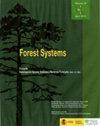Multidimensional analysis of the factors affecting the organizational and managerial structure of state forest management: Türkiye example
IF 0.8
4区 农林科学
Q3 FORESTRY
引用次数: 0
Abstract
Aim of study: To reveal the most important factors affecting the administrative and organizational structure in Türkiye's forestry and their effects with a multidimensional approach. Area of study: Nine provinces of Türkiye (İstanbul, İzmir, Antalya, Adana, Bolu, Trabzon, Erzurum, Şanlıurfa, and Ankara), which represent nine geographic regions, where forestry activities are intensive. Material and methods: Through the consideration of the literature review and expert opinions, 29 variables affecting the organizational and managerial structure were developed. These variables were grouped under six main headings, and questionnaire forms were prepared accordingly. They were applied to 463 technical and managerial staff in the forestry organizations with the face-to-face interview method. To evaluate the data, descriptive statistics, factor analysis, multiple regression analysis, and the Kruskal-Wallis H Test were used. Main results: The most important factors affecting the organizational and managerial structure were found to be (i) working conditions and job satisfaction, (ii) educational level of employees, (iii) technical and managerial competence, and (iv) solidarity and institutional support. Approximately 67% of the managerial and organizational structure of Türkiye’s forestry was explained by these four factors. The differences in the views of the interviewees in terms of working conditions and job satisfaction, educational level, technical and managerial competence, and solidarity and institutional support factors were determined according to some task variables. Research highlights: Enabling employees in managerial positions to have postgraduate education and to apply their knowledge and experience is effective in increasing job satisfaction, managerial competence, participation in managerial decisions, and thus sustainable forestry.影响国有森林经营组织经营结构因素的多维分析:以林基耶为例
研究目的:用多维方法揭示影响土耳其林业行政和组织结构的最重要因素及其影响。研究地区:土耳其的九个省(伊斯坦布尔、伊兹密尔、安塔利亚、阿达纳、博卢、特拉布宗、埃尔祖鲁姆、Şanlıurfa和安卡拉),代表了林业活动密集的九个地理区域。材料和方法:通过考虑文献综述和专家意见,开发了29个影响组织和管理结构的变量。这些变量分为六个主要标题,并据此编制了调查表。采用面对面访谈的方法,对林业组织的463名技术和管理人员进行了问卷调查。为了评估数据,使用了描述性统计、因子分析、多元回归分析和Kruskal-Wallis H检验。主要结果:影响组织和管理结构的最重要因素是(i)工作条件和工作满意度,(ii)员工的教育水平,(iii)技术和管理能力,以及(iv)团结和机构支持。土耳其林业大约67%的管理和组织结构是由这四个因素解释的。受访者在工作条件和工作满意度、教育水平、技术和管理能力以及团结和机构支持因素方面的观点差异是根据一些任务变量确定的。研究重点:让担任管理职务的员工接受研究生教育并运用他们的知识和经验,可以有效地提高工作满意度、管理能力、参与管理决策,从而实现可持续林业。
本文章由计算机程序翻译,如有差异,请以英文原文为准。
求助全文
约1分钟内获得全文
求助全文
来源期刊

Forest Systems
FORESTRY-
CiteScore
1.40
自引率
14.30%
发文量
30
审稿时长
6-12 weeks
期刊介绍:
Forest Systems is an international peer-reviewed journal. The main aim of Forest Systems is to integrate multidisciplinary research with forest management in complex systems with different social and ecological background
 求助内容:
求助内容: 应助结果提醒方式:
应助结果提醒方式:


